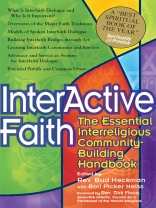A Practical Guide for Embracing the Growing Religious Pluralism in America
‘In the process of [interfaith] engagement, we discover … a world in which our faith is richer, deeper, and more contextualized, and God’s very Self is seen in more of its fullness.’
—from the Introduction
This practical guide to the key methods and resources of the interfaith movement will help you effectively engage people of other faith traditions in order to increase understanding and acceptance in your community and beyond.
Drawing on the knowledge and experience of interfaith leaders from the world’s many faith traditions—Christianity, Judaism, Islam, Buddhism, Hinduism, Bahá’í Faith, Jainism, Shinto, Sikh Faith, Taoism, Zoroastrianism—this comprehensive resource provides practical ideas for connecting with people of all faiths and backgrounds through common concerns and activities that promote respect and support. It enables communities rich with diversity to work together to create paths toward peace and justice.
Mục lục
Foreword by Rev. Dirk Ficca xi
Acknowledgments xv
INTRODUCTION
Interfaith Dialogue: What Is It and Why Is It Important? 1
PART I
Creating Interreligious Community through Dialogue
1. Dialogue through Conversation—Spoken Dialogue 23
by Rev. Dr. Francis Tiso
2. Dialogue through Arts—’Opening the World’s Door’ 43
by Abby Stamelman Hocky, MSW, Rev. Susan Teegen-Case, and Rabbi Carol Harris-Shapiro
3. Dialogue through Observation and Participation— Interfaith Prayer Services 77
by Rev. Dr. Clark Lobenstine
PART II
Living Interreligious Dialogue through Service and Advocacy
4. Action through Service—From Shared Values to Common Action 111
by Dr. Eboo Patel, April Kunze, and Noah Silverman
5. Action through Advocacy: Many Faiths, Common Purpose 139
by Rev. Dr. C. Welton Gaddy
PART III
Interfaith Resources
6. Brief Overview of Faith Traditions 157
7. Interfaith Organizations and the Web 191
8. Suggestions for Other Resources 215
Appendix A
A Taxonomy of Interfaith
by Bud Heckman 223
Appendix B
A Closer Look at Swidler’s “Dialogue Decalogue”
by Rev. Dr. Francis Tiso 231
Appendix C
A Formal Model: The West Coast Dialogue of Catholics and Muslims
by Rev. Dr. Francis Tiso 241
Notes 253
About the Contributors 257
About Religions for Peace 261
Index 263
Giới thiệu về tác giả
Rev. Susan Teegen-Case is the founder and director of the Arts & Spirituality Center, an organization comprised of both artists and spiritual leaders that focuses on the interplay of artistic and spiritual avenues as a path to healing. Her experiences as an interfaith chaplain helped shape her theories about the power of creative expression to fuel nonviolence and community revitalization.







![Bìa của Brian Schrag & Julisa Rowe: Community Arts for God's Purposes [Chinese] 貼近神心意的社群藝術 Bìa của Brian Schrag & Julisa Rowe: Community Arts for God's Purposes [Chinese] 貼近神心意的社群藝術](https://static.worldofdigitals.com/thumb_webp/740/9781645083740.webp)




